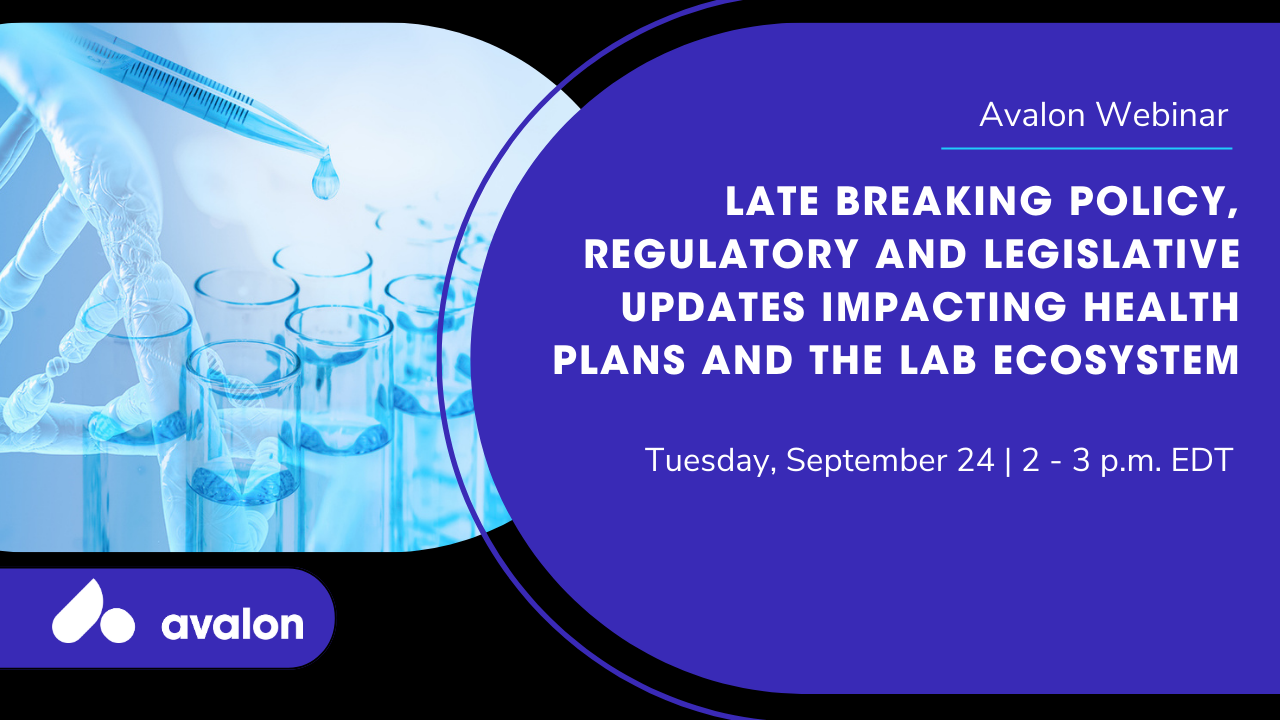Late Breaking Policy, Regulatory, and Legislative Updates Impacting Health Plans and the Lab Ecosystem
On Sept. 25th, 2024, an Avalon webinar was hosted by Michele Norton, Senior Vice President of Product Marketing at Avalon. The webinar introduced key updates on policy, legislative, and regulatory changes affecting health plans and the laboratory ecosystem. The session featured Julie Barnes, founder and CEO of Maverick Health Policy, and Alex Sommer, Vice President of State Government Affairs at Avalon. The presenters discussed both federal and state developments and highlighted the potential impact of the upcoming U.S. presidential election on healthcare.
Medicare Advantage Star Ratings and Payment Reform:
Julie Barnes opened the discussion by focusing on Medicare Advantage Star Ratings, a key concern for health plans. The adjustment in star ratings following a recent lawsuit has increased quality bonus payments for over 60 plans. Barnes emphasized upcoming changes in the Health Equity Index for 2027, which will evaluate health plans based on their ability to address disparities among members with social risk factors. This shift will likely impact future bonus payments for Medicare Advantage plans.
Barnes also brought up the issue of payment reform and value-based care. Additionally:
- The Senate Finance Committee is exploring ways to adjust how Medicare pays physicians, especially in managing chronic conditions.
- The CMS Innovation Center is working on improving data-sharing infrastructures to enhance value-based care participation.
- The proposed Medicare Physician Fee Schedule: would reward primary care physicians for managing complex patients under a new model.
Prior Authorization and State-Level Legislative Actions:
One of the most significant topics discussed was prior authorization—a leading concern, according to a poll taken during the webinar. The presenters explained how federal and state governments are tackling inefficiencies in the prior authorization process. United Healthcare’s new Gold Card Program, which eliminates the need for prior authorization for certain services, was noted as one company’s attempt at a potential solution to reduce administrative burdens.
Alex Sommer detailed how state-level reforms are being implemented to improve transparency and standardize processes. More than 10 states enacted reforms in 2024, with efforts focusing on establishing electronic prior authorization systems and creating standardized forms to streamline the process. Additionally, gold carding legislation—mandating payers to exempt certain providers from prior authorization requirements—has gained traction in several states.
Artificial Intelligence in Healthcare:
The use of artificial intelligence (AI) in healthcare, particularly in prior authorization, was another key topic. Both federal and state governments are grappling with how to regulate AI while fostering innovation. Julie Barnes mentioned the passage of AI legislation in Colorado—the first in the U.S. to establish a comprehensive framework for the ethical use of AI systems in healthcare. Barnes also touched on federal lawsuits concerning AI in prior authorization, reflecting the growing scrutiny around the use of algorithms in healthcare decision-making.
Federal and State Policy Trends in Lab Testing:
Alex Sommer addressed policy trends affecting lab testing, noting that states are increasingly mandating coverage for biomarker testing and other diagnostic tools. In 2024, six new states—Colorado, Connecticut, Florida, Indiana, Iowa, and Pennsylvania—passed biomarker testing mandates, bringing the total to 21 states. Additionally, Kentucky expanded its cancer screening mandate to ensure broader coverage of diagnostic tests. This shift toward comprehensive diagnostic testing mandates is expected to continue as genetic and precision medicine tools evolve.
Impact of the Presidential Election and Federal Elections:
The final segment of the webinar focused on the potential impact of the upcoming U.S. presidential election. Julie Barnes emphasized the difference in healthcare policy approaches between Democrats and Republicans. If a Democrat wins the presidency, the focus will likely be on expanding federal power and scrutinizing Medicare Advantage plans, particularly in terms of reducing private-sector involvement. A Republican victory, particularly if Donald Trump is re-elected, would result in more executive orders rolling back Democratic healthcare reforms.
Barnes also mentioned congressional gridlock as a likely outcome of the election due to thin margins, regardless of which party wins. As a result, large-scale legislative changes are unlikely, though there may be movement on specific issues such as:
- Pharmacy benefit manager (PBM) reform
- Site-neutral payments and
- Medicare Advantage scrutiny
Conclusion:
Health professionals and stakeholders in the lab ecosystem should remain informed about these evolving trends, as they will significantly affect healthcare delivery and cost structures in the coming years.

